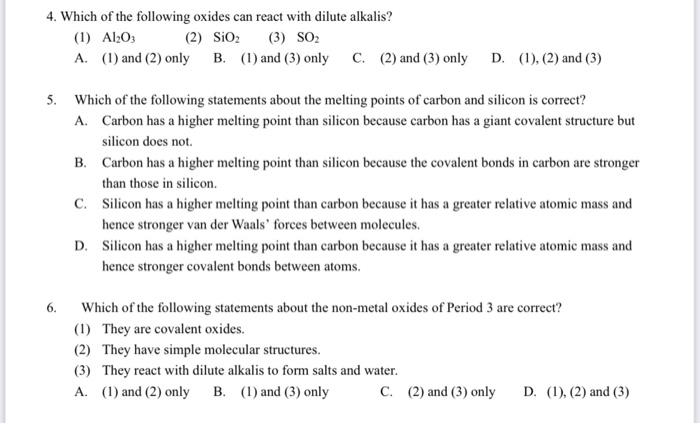Answered step by step
Verified Expert Solution
Question
1 Approved Answer
please help with this three questions , thank you so much 4. Which of the following oxides can react with dilute alkalis? (1) Al2O3 (2)
please help with this three questions , thank you so much 
4. Which of the following oxides can react with dilute alkalis? (1) Al2O3 (2) SiO2 (3) SO2 A. (1) and (2) only B. (1) and (3) only C. (2) and (3) only D. (1), (2) and (3) 5. Which of the following statements about the melting points of carbon and silicon is correct? A. Carbon has a higher melting point than silicon because carbon has a giant covalent structure but silicon does not. B. Carbon has a higher melting point than silicon because the covalent bonds in carbon are stronger than those in silicon. C. Silicon has a higher melting point than carbon because it has a greater relative atomic mass and hence stronger van der Waals' forces between molecules. D. Silicon has a higher melting point than carbon because it has a greater relative atomic mass and hence stronger covalent bonds between atoms. 6. Which of the following statements about the non-metal oxides of Period 3 are correct? (1) They are covalent oxides. (2) They have simple molecular structures. (3) They react with dilute alkalis to form salts and water. A. (1) and (2) only B. (1) and (3) only C. (2) and (3) only D. (1), (2) and (3) 
Step by Step Solution
There are 3 Steps involved in it
Step: 1

Get Instant Access to Expert-Tailored Solutions
See step-by-step solutions with expert insights and AI powered tools for academic success
Step: 2

Step: 3

Ace Your Homework with AI
Get the answers you need in no time with our AI-driven, step-by-step assistance
Get Started


